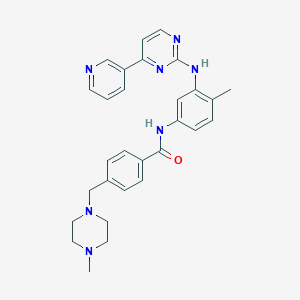
Imatinib
Cat. No. B000729
M. Wt: 493.6 g/mol
InChI Key: KTUFNOKKBVMGRW-UHFFFAOYSA-N
Attention: For research use only. Not for human or veterinary use.
Patent
US07456283B2
Procedure details


A suspension of N-(3-guanidino-4-methyl-phenyl)-4-(4-methyl-piperazin-1-ylmethyl)-benzamide (30 g, 79 mmol) in n-butanol (150 ml) at 120° C. under an atmosphere of nitrogen is treated with 3-dimethylamino-1-pyridin-3-yl-propenone (15.3 g, 87 mmol). The resulting suspension is heated at 150° C. for 5 hrs. The reaction mixtures becomes a homogeneous deep orange solution and dimethylamine is removed by the distillation of n-butanol (130 ml). n-Butanol (20 ml) is added during the distillation. Butyl acetate (60 ml) is added dropwise at 100° C. and the solution is cooled to 0° C. within 1 hr and stirred at 0° C. for 16 hrs. The resulting deep orange suspension is filtered off with suction, the isolated solid is washed with n-butanol (2×50 ml) and water (2×50 ml) and dried in vacuo at 60° C. Yield: 36.4 g of the title compound, 93% based on theory, as off-whitecrystals. (99.6% area by HPLC).
Quantity
30 g
Type
reactant
Reaction Step One


[Compound]
Name
3-dimethylamino-1-pyridin-3-yl-propenone
Quantity
15.3 g
Type
reactant
Reaction Step Two


Identifiers


|
REACTION_CXSMILES
|
[NH:1]([C:5]1[CH:6]=[C:7]([NH:12][C:13](=[O:28])[C:14]2[CH:19]=[CH:18][C:17]([CH2:20][N:21]3[CH2:26][CH2:25][N:24]([CH3:27])[CH2:23][CH2:22]3)=[CH:16][CH:15]=2)[CH:8]=[CH:9][C:10]=1[CH3:11])[C:2]([NH2:4])=[NH:3].[CH3:29][NH:30][CH3:31]>C(O)CCC>[CH3:27][N:24]1[CH2:25][CH2:26][N:21]([CH2:20][C:17]2[CH:16]=[CH:15][C:14]([C:13]([NH:12][C:7]3[CH:8]=[CH:9][C:10]([CH3:11])=[C:5]([NH:1][C:2]4[N:4]=[C:5]([C:10]5[CH:29]=[N:30][CH:31]=[CH:8][CH:9]=5)[CH:6]=[CH:7][N:3]=4)[CH:6]=3)=[O:28])=[CH:19][CH:18]=2)[CH2:22][CH2:23]1
|
Inputs


Step One
|
Name
|
|
|
Quantity
|
30 g
|
|
Type
|
reactant
|
|
Smiles
|
N(C(=N)N)C=1C=C(C=CC1C)NC(C1=CC=C(C=C1)CN1CCN(CC1)C)=O
|
|
Name
|
|
|
Quantity
|
150 mL
|
|
Type
|
solvent
|
|
Smiles
|
C(CCC)O
|
Step Two
[Compound]
|
Name
|
3-dimethylamino-1-pyridin-3-yl-propenone
|
|
Quantity
|
15.3 g
|
|
Type
|
reactant
|
|
Smiles
|
|
Step Three
|
Name
|
|
|
Quantity
|
0 (± 1) mol
|
|
Type
|
reactant
|
|
Smiles
|
CNC
|
Conditions


Temperature
|
Control Type
|
UNSPECIFIED
|
|
Setpoint
|
150 °C
|
Stirring
|
Type
|
CUSTOM
|
|
Details
|
stirred at 0° C. for 16 hrs
|
|
Rate
|
UNSPECIFIED
|
|
RPM
|
0
|
Other
|
Conditions are dynamic
|
1
|
|
Details
|
See reaction.notes.procedure_details.
|
Workups


CUSTOM
|
Type
|
CUSTOM
|
|
Details
|
is removed by the distillation of n-butanol (130 ml)
|
ADDITION
|
Type
|
ADDITION
|
|
Details
|
n-Butanol (20 ml) is added during the distillation
|
ADDITION
|
Type
|
ADDITION
|
|
Details
|
Butyl acetate (60 ml) is added dropwise at 100° C.
|
TEMPERATURE
|
Type
|
TEMPERATURE
|
|
Details
|
the solution is cooled to 0° C. within 1 hr
|
|
Duration
|
1 h
|
FILTRATION
|
Type
|
FILTRATION
|
|
Details
|
The resulting deep orange suspension is filtered off with suction
|
WASH
|
Type
|
WASH
|
|
Details
|
the isolated solid is washed with n-butanol (2×50 ml) and water (2×50 ml)
|
CUSTOM
|
Type
|
CUSTOM
|
|
Details
|
dried in vacuo at 60° C
|
Outcomes


Product
Details
Reaction Time |
16 h |
|
Name
|
|
|
Type
|
|
|
Smiles
|
CN1CCN(CC1)CC1=CC=C(C(=O)NC2=CC(=C(C=C2)C)NC2=NC=CC(=N2)C=2C=NC=CC2)C=C1
|
Source


|
Source
|
Open Reaction Database (ORD) |
|
Description
|
The Open Reaction Database (ORD) is an open-access schema and infrastructure for structuring and sharing organic reaction data, including a centralized data repository. The ORD schema supports conventional and emerging technologies, from benchtop reactions to automated high-throughput experiments and flow chemistry. Our vision is that a consistent data representation and infrastructure to support data sharing will enable downstream applications that will greatly improve the state of the art with respect to computer-aided synthesis planning, reaction prediction, and other predictive chemistry tasks. |
